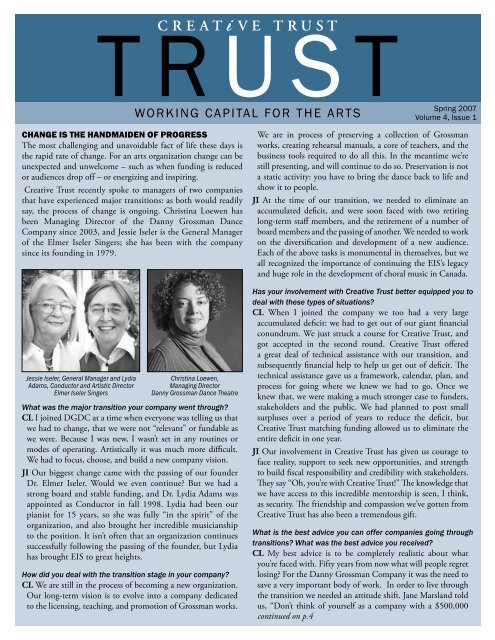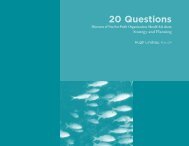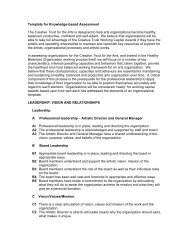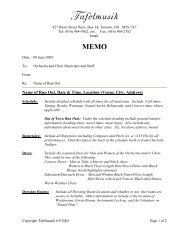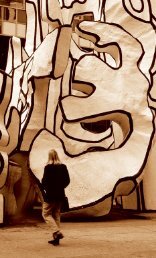WORKING CAPITAL FOR THE ARTS - Creative Trust
WORKING CAPITAL FOR THE ARTS - Creative Trust
WORKING CAPITAL FOR THE ARTS - Creative Trust
Create successful ePaper yourself
Turn your PDF publications into a flip-book with our unique Google optimized e-Paper software.
T R U S T<br />
<strong>WORKING</strong> <strong>CAPITAL</strong> <strong>FOR</strong> <strong>THE</strong> <strong>ARTS</strong><br />
Spring 2007<br />
Volume 4, Issue 1<br />
CHANGE IS <strong>THE</strong> HANDMAIDEN OF PROGRESS<br />
The most challenging and unavoidable fact of life these days is<br />
the rapid rate of change. For an arts organization change can be<br />
unexpected and unwelcome – such as when funding is reduced<br />
or audiences drop off – or energizing and inspiring.<br />
<strong>Creative</strong> <strong>Trust</strong> recently spoke to managers of two companies<br />
that have experienced major transitions: as both would readily<br />
say, the process of change is ongoing. Christina Loewen has<br />
been Managing Director of the Danny Grossman Dance<br />
Company since 2003, and Jessie Iseler is the General Manager<br />
of the Elmer Iseler Singers; she has been with the company<br />
since its founding in 1979.<br />
Jessie Iseler, General Manager and Lydia<br />
Adams, Conductor and Artistic Director<br />
Elmer Iseler Singers<br />
Christina Loewen,<br />
Managing Director<br />
Danny Grossman Dance Theatre<br />
What was the major transition your company went through?<br />
CL I joined DGDC at a time when everyone was telling us that<br />
we had to change, that we were not “relevant” or fundable as<br />
we were. Because I was new, I wasn’t set in any routines or<br />
modes of operating. Artistically it was much more difficult.<br />
We had to focus, choose, and build a new company vision.<br />
JI Our biggest change came with the passing of our founder<br />
Dr. Elmer Iseler. Would we even continue? But we had a<br />
strong board and stable funding, and Dr. Lydia Adams was<br />
appointed as Conductor in fall 1998. Lydia had been our<br />
pianist for 15 years, so she was fully “in the spirit” of the<br />
organization, and also brought her incredible musicianship<br />
to the position. It isn’t often that an organization continues<br />
successfully following the passing of the founder, but Lydia<br />
has brought EIS to great heights.<br />
How did you deal with the transition stage in your company?<br />
CL We are still in the process of becoming a new organization.<br />
Our long-term vision is to evolve into a company dedicated<br />
to the licensing, teaching, and promotion of Grossman works.<br />
We are in process of preserving a collection of Grossman<br />
works, creating rehearsal manuals, a core of teachers, and the<br />
business tools required to do all this. In the meantime we’re<br />
still presenting, and will continue to do so. Preservation is not<br />
a static activity: you have to bring the dance back to life and<br />
show it to people.<br />
JI At the time of our transition, we needed to eliminate an<br />
accumulated deficit, and were soon faced with two retiring<br />
long-term staff members, and the retirement of a number of<br />
board members and the passing of another. We needed to work<br />
on the diversification and development of a new audience.<br />
Each of the above tasks is monumental in themselves, but we<br />
all recognized the importance of continuing the EIS’s legacy<br />
and huge role in the development of choral music in Canada.<br />
Has your involvement with <strong>Creative</strong> <strong>Trust</strong> better equipped you to<br />
deal with these types of situations?<br />
CL When I joined the company we too had a very large<br />
accumulated deficit: we had to get out of our giant financial<br />
conundrum. We just struck a course for <strong>Creative</strong> <strong>Trust</strong>, and<br />
got accepted in the second round. <strong>Creative</strong> <strong>Trust</strong> offered<br />
a great deal of technical assistance with our transition, and<br />
subsequently financial help to help us get out of deficit. The<br />
technical assistance gave us a framework, calendar, plan, and<br />
process for going where we knew we had to go. Once we<br />
knew that, we were making a much stronger case to funders,<br />
stakeholders and the public. We had planned to post small<br />
surpluses over a period of years to reduce the deficit, but<br />
<strong>Creative</strong> <strong>Trust</strong> matching funding allowed us to eliminate the<br />
entire deficit in one year.<br />
JI Our involvement in <strong>Creative</strong> <strong>Trust</strong> has given us courage to<br />
face reality, support to seek new opportunities, and strength<br />
to build fiscal responsibility and credibility with stakeholders.<br />
They say “Oh, you’re with <strong>Creative</strong> <strong>Trust</strong>!” The knowledge that<br />
we have access to this incredible mentorship is seen, I think,<br />
as security. The friendship and compassion we’ve gotten from<br />
<strong>Creative</strong> <strong>Trust</strong> has also been a tremendous gift.<br />
What is the best advice you can offer companies going through<br />
transitions? What was the best advice you received?<br />
CL My best advice is to be completely realistic about what<br />
you’re faced with. Fifty years from now what will people regret<br />
losing? For the Danny Grossman Company it was the need to<br />
save a very important body of work. In order to live through<br />
the transition we needed an attitude shift. Jane Marsland told<br />
us, “Don’t think of yourself as a company with a $500,000<br />
continued on p.4
Plus ça change: Letter From the Executive Director<br />
This newsletter’s cover story is about two <strong>Creative</strong><br />
<strong>Trust</strong> companies that have undergone<br />
significant transitions, both artistically and<br />
administratively. The changes Danny Grossman<br />
Dance Company and the Elmer Iseler<br />
Singers faced are not unusual among mid-sized<br />
performing arts organizations in Toronto: all<br />
of our companies are facing change, to greater<br />
or lesser extent.<br />
Nello McDaniel of <strong>ARTS</strong> Action Research emphasizes the fundamental<br />
need for organizations to be observant and to have the knowledge<br />
to deal with inevitable changes in their external environments. They<br />
have to have monitoring systems in place for quick financial turn<br />
around when necessary, and must also be able to recognize when their<br />
organizations are at the “tipping point,” when adverse environmental<br />
change can spin into crisis.<br />
Other stabilization programs have sometimes been heavy-handed<br />
and prescriptive about how organizations should be run, concerning<br />
themselves with what an organization is “supposed to do” rather than<br />
what it needs to do. While some rules are helpful and appropriate (like<br />
the need for financial balance and sufficient capitalization), across-theboard<br />
rules tend to assume that each organization is fundamentally the<br />
same. This, as we know, is not the case, and these types of expectations<br />
can distract a company from dealing with its most urgent needs.<br />
In order to achieve stability and balance among participating<br />
companies <strong>Creative</strong> <strong>Trust</strong> has placed its emphasis on building skills<br />
and creating a team trained in problem solving. We are interested<br />
in helping organizations become self-aware, rooted in their artistic<br />
visions and missions, and flexible. We stress the importance of open<br />
communications, and the development of a leadership team that has the<br />
knowledge and experience to actively and confidently confront changes<br />
- including those that threaten the organization’s future health.<br />
Change can also be joyful. <strong>Creative</strong> <strong>Trust</strong> recently entered the final<br />
phase of its fundraising campaign. We are now within $520,000 of the<br />
$6.1 million that will enable us to provide financial, as well as technical<br />
assistance to all the performing arts companies that meet our program’s<br />
requirements, and whose survival is essential to Toronto’s cultural future.<br />
With this exciting transition, and with your continuing support, we will<br />
soon be able to focus more on sharing the important things we have<br />
learned about building strong and sustainable organizations with arts<br />
and other non-profits throughout the Province.<br />
Hats Off to a Successful Second Year!<br />
Here at <strong>Creative</strong> <strong>Trust</strong> we love a celebration.<br />
Happiness, achievement, and excellence<br />
are all worth being feted and, luckily for us,<br />
the success of our participating companies<br />
gives us reason to rejoice. At the end of<br />
the second year of the program <strong>Creative</strong><br />
<strong>Trust</strong> participants were awarded $372,836<br />
in matching grants for deficit reduction or<br />
elimination, and Working Capital Awards.<br />
Go team <strong>Creative</strong> <strong>Trust</strong>! Thank you for<br />
giving us cause for applause.<br />
Allen MacInnis and Craig Morash, LKTYP<br />
Back at the office, we worked on increasing<br />
the program’s size, scope and impact.<br />
In 2005, we expanded the core program<br />
to include 11 additional companies,<br />
for a total of 22 participants. We also<br />
launched the Outreach Initiative, which<br />
offers to 30 smaller creative performing<br />
arts organizations the advantages<br />
of the program’s capacity-building<br />
workshops, seminars and roundtables.<br />
Highlights from 2005 Evaluation Report<br />
R For the 11 companies admitted in round<br />
one (2004), total revenues increased<br />
by 6.9% or $1 million over the first two<br />
years in the program.<br />
R Private sector fundraising for these<br />
companies rose over the two-year period<br />
by an average of 13.6% or $447,000, to<br />
23.3% of their increased revenues.<br />
R For the six companies that entered<br />
<strong>Creative</strong> <strong>Trust</strong> in round one with<br />
accumulated deficits, the result was<br />
dramatic: two companies fully eliminated<br />
their deficits, and the other four made<br />
significant progress on deficit reduction<br />
and project their elimination in the next<br />
year. Accumulated deficits decreased<br />
by 38.3% or $264,000 overall.<br />
R By the end of the second year, the<br />
average working capital positions of<br />
the first 11 companies had improved to<br />
1.2% of their increased revenues.<br />
R Three companies entering the program<br />
in 2005 entirely eliminated their<br />
accumulated deficits in their first year<br />
with <strong>Creative</strong> <strong>Trust</strong>. Overall, for the<br />
11 companies entering the program<br />
that year, the working capital of<br />
those that had accumulated deficits<br />
on entry improved in one year of<br />
participation, from minus 6.4% to<br />
minus .5% of combined revenues.<br />
The Year’s Program Achievements Included<br />
R Four Roundtables, on “Growing<br />
Audiences” and “Key Components<br />
for Organizational Health.” Four days<br />
of Financial Management Seminars.<br />
Two Green Room speakers’ sessions<br />
on “Diversity and the Arts” and “The<br />
Fundraising Ask.”<br />
R The program did intensive work with<br />
participating companies, providing over<br />
294 individual consultations.<br />
R The launch of the Outreach Initiative,<br />
which offers 30 smaller creative<br />
performing arts organizations the<br />
advantages of the program’s capacitybuilding<br />
workshops, seminars and<br />
roundtables. We presented five<br />
Outreach learning sessions.<br />
R Seven companies were developing<br />
revenues through market and audience<br />
development initiatives, community<br />
outreach and/or enhanced subscription<br />
bases.<br />
A special thank you to all our seminar<br />
leaders and contributing members; we are<br />
especially grateful to our wonderful board<br />
who have inspired us with their dedication<br />
and motivated us to seek further success.<br />
Bring on year three!
New At <strong>Creative</strong> <strong>Trust</strong><br />
Fundraising Update<br />
We have been very fortunate at <strong>Creative</strong> <strong>Trust</strong> to be surrounded<br />
by people that believe in the work we are doing and want to help<br />
make positive change for Toronto’s mid-sized arts community.<br />
In recent months we brought in nearly $50,000 from our<br />
December individual mail campaign as well as major gifts from<br />
both individual and corporate donors. We are especially grateful<br />
to the generosity of new major donors.<br />
Roger and Kevin Garland<br />
T.R. Meighan Family Foundation<br />
Rogers Communications<br />
Phil Lind<br />
CIBC Mellon<br />
All in all, <strong>Creative</strong> <strong>Trust</strong> has achieved outstanding fundraising<br />
success so far, with 92% of the campaign goal achieved.<br />
This leaves only $520,000 left to raise.<br />
Many thanks to all of you. We’ll be sure to keep you informed<br />
as the campaign unfolds, keep your eyes open for a very<br />
exciting announcement. At this busy time every bit of support<br />
and encouragement helps as we close in on our goal.<br />
Hellos and Goodbyes<br />
This past fall after four years J. Alexander (Sandy) Houston stepped<br />
down from our board of directors. As Executive Director of the<br />
George Cedric Metcalf Foundation, Sandy was one of the early<br />
believers and funders of <strong>Creative</strong> <strong>Trust</strong>. He was instrumental in the<br />
important planning and policy development era of <strong>Creative</strong> <strong>Trust</strong>,<br />
helping shape the Working Capital for the Arts Program into what<br />
it is today. Sandy always encouraged us to look hard at what we<br />
were doing from an outside perspective and he is missed at the<br />
board table. However we are happy to welcome Sandy to his new<br />
role on our Advisory Council, where we can continue to benefit from<br />
his wisdom and advice.<br />
In October we welcomed Celia Smith to<br />
the board of <strong>Creative</strong> <strong>Trust</strong>. Celia brings<br />
a wealth of experience direct from the<br />
trenches of arts management. She is<br />
currently the President of the Board of the<br />
Toronto Alliance for the Performing Arts<br />
(TAPA) and was the General Manager of<br />
the Canadian Stage Company (CanStage)<br />
from 2001-2006. Already Celia has had<br />
made a large impact at our board table and has been active in<br />
our seminars and workshops. Welcome Celia.<br />
Planning for Change By Shana Hillman<br />
To be honest when I heard the latest<br />
in a series of Arts Action Research’s<br />
Roundtables would focus on planning I<br />
sighed. How many of us have undergone<br />
a long and cumbersome strategic planning<br />
session?<br />
After nearly 12 years in administration<br />
a planning session meant one thing to<br />
me – lots of flip charts and index cards<br />
to type up afterwards into an impressive<br />
document that would sit on the shelf<br />
gathering dust until a few months before<br />
the next planning session.<br />
Last October nearly 25 artistic directors<br />
and managers gathered for the latest<br />
Roundtable on Planning. Imagine my<br />
surprise when in the first few minutes<br />
George Thorn told us that these<br />
traditional planning sessions benefited<br />
few but consultants and the makers of flip<br />
charts and markers. I breathed a sigh of<br />
relief and settled in for what I knew was<br />
going to be a great ride.<br />
As ever AAR’s organic concepts and artdriven<br />
approach spoke eloquently to the<br />
artists and managers around the table.<br />
The session began with a quick review of<br />
AAR’s Conceptual process, acknowledging<br />
all that is powerful, positive and right in<br />
our arts practices, and stressing that there<br />
is no such thing as a planning mold. Each<br />
organization is unique in the art they are<br />
creating and therefore should be as unique<br />
in their planning process.<br />
Thorn emphasized that the professional<br />
leadership (managers and artistic<br />
leaders) should be at the centre of the<br />
planning process. They recommended the<br />
professional leaders start first, developing<br />
a planning profile including the<br />
philosophy, core values and beliefs, the<br />
aesthetic, curatorial and/or programmatic<br />
framework and the working values for<br />
the organization.<br />
They then encouraged them to cast<br />
members from their core – board members,<br />
long term donors, collaborators and staff<br />
– to be part of each round of the drafting<br />
and editing of this profile.<br />
Perhaps the most important point of the<br />
day was that plans should not be static<br />
and unchanging and in fact when a final<br />
draft is completed it should be a living<br />
document, referred to and updated as<br />
one would an annual budget. No matter<br />
what happens day-to-day, the plan will<br />
serve as a base line to return to for making<br />
informed strategic decisions.<br />
Nancy Webster and Alex MacInnis<br />
of LKTYP were on hand to present a<br />
case study of their own very successful<br />
experiences using the planning process.<br />
The group left the room with an overall<br />
sense of renewal, secure in the knowledge<br />
that whatever gets thrown our way we<br />
now had the tools to deal with it and<br />
carry us forward.<br />
Participants enjoying AAR’s roundtable on Planning<br />
A Breakout group from our recent day-long<br />
fundraising workshop
CHANGE IS <strong>THE</strong> HANDMAIDEN OF PROGRESS cont.<br />
budget; think about what kind of a company you can be on<br />
less. Revise your scale.” This was some of the best advice we<br />
received. Lights went on, bells started ringing – and new<br />
ideas became possible.<br />
JI The consistency of advice we received from <strong>Creative</strong> <strong>Trust</strong><br />
was the most important. We were never pressed to rush, but<br />
rather to be thoughtful in our decision-making. It was as if<br />
we were given a few seeds that sprouted, grew, blossomed,<br />
and had to be protected through the winter – this is the kind<br />
of caring and blossoming that EIS has experienced through<br />
<strong>Creative</strong> <strong>Trust</strong>.<br />
Evolution and change in artistic creation is often considered<br />
an opportunity for dynamic potential, while structural and<br />
organizational change is more often met with anxiety.<br />
Why is that?<br />
CL Sometimes it’s not really true: for our company there was<br />
lots of anxiety artistically. But changing an organization,<br />
structurally, is not something we’re trained to do. If you go<br />
to school in arts management, you’re taught principles and<br />
formulas and strategies that you’re eager to apply — looking<br />
forward to seeing the terrific results you were taught to<br />
expect. When these principles don’t work in reality you have<br />
to say to yourself “I’m not really an arts administrator, I’m<br />
an entrepreneur.” You have to create something new and<br />
make it work.<br />
JI Often, because the art and administration are so joined<br />
at the hip, both sides change at the same time. I do know<br />
that teamwork brings trust and opportunities. The artistic<br />
entity needs a very strong backbone, and this is only possible<br />
through the talent (sometimes brilliance) of administrators,<br />
and the kindness of philanthropy.<br />
Is change the handmaiden of progress?<br />
CL I don’t believe in progress. Change may be the handmaiden<br />
of process, but for every step forward there’s something lost, so<br />
you can’t think you’re really advancing – what you are doing<br />
is changing. I’ve learned to apply the principle of dynamic<br />
balance that I learned from <strong>Creative</strong> <strong>Trust</strong>. You have to keep<br />
moving, keep going forward. As administrators, this gives us<br />
the opportunity to be creative – and that’s exciting.<br />
JI How about “Patience is a virtue and perseverance is<br />
imperative!” Or, as we learn from Leonard Bernstein’s brilliant<br />
Kaddish Symphony: “Believe!”<br />
PARTICIPATING COMPANIES,<br />
ROUND ONE<br />
Ballet Jörgen Canada<br />
Buddies in Bad Times Theatre<br />
Dancemakers<br />
Elmer Iseler Singers<br />
Kaeja d’Dance<br />
Lorraine Kimsa Theatre for Young People<br />
Opera Atelier<br />
Tafelmusik Baroque Orchestra and<br />
Chamber Choir<br />
Tapestry New Opera Works<br />
Théâtre français de Toronto<br />
Toronto Dance Theatre<br />
PARTICIPATING COMPANIES,<br />
ROUND TWO<br />
Danny Grossman Dance Company<br />
Esprit Orchestra<br />
Factory Theatre<br />
Necessary Angel<br />
Nightwood Theatre<br />
Soundstreams<br />
Tarragon Theatre<br />
Theatre Direct<br />
Theatre Passe Muraille<br />
Toronto Children’s Chorus<br />
OUTREACH COMPANIES<br />
b current<br />
Ballet Creole<br />
Cahoots Theatre Projects<br />
Carlos Bulosan Culture Workshop<br />
CanAsian Dance Festival<br />
The Centre for Indigenous Theatre<br />
Clay and Paper Theatre<br />
COBA Collective Of Black Artists<br />
Crow’s Theatre<br />
Dance Immersion<br />
Ensemble Noir<br />
Esmeralda Enrique Spanish Dance<br />
Fujiwara Dance Inventions<br />
Hannaford Street Silver Band<br />
inDANCE (Hari Krishnan)<br />
Little Pear Garden Collective<br />
Menaka Thakkar Dance Company<br />
Modern Times Stage Company<br />
Muhtadi International Drumming Festival<br />
Native Earth Performing Arts<br />
Obsidian Theatre Company<br />
Princess Productions (Yvonne Ng)<br />
Red Sky Performance<br />
The Theatre Centre<br />
Tribal Crackling Wind (Peter Chin)<br />
ADVISORY COUNCIL<br />
Yvonne Chiu, C. M.<br />
Robert Farquharson<br />
Lynda Friendly<br />
Claire Hopkinson<br />
Peter Jeffery<br />
Judy Matthews<br />
John McKellar, C. M.<br />
David Mirvish, C.M., O. Ont.<br />
Nan Shuttleworth<br />
David Silcox<br />
Nalini Stewart, O. Ont.<br />
Connie Wansbrough<br />
Harriet Bunting Weld<br />
Joyce Zemans, C.M.<br />
BOARD OF DIRECTORS<br />
Sandra Pitblado, President<br />
Mallory Gilbert, Treasurer<br />
Joan Bosworth<br />
Derek C. Hayes<br />
Frances Price<br />
J. Brett Ledger<br />
Suzanne Weiss<br />
Celia Smith<br />
ADMINISTRATION<br />
Jini Stolk, Executive Director<br />
Peter Brown,<br />
Program Development and<br />
Evaluation Director<br />
Jane Marsland, Technical<br />
Assistance Director<br />
Shana Hillman, Administrative<br />
and Program Coordinator<br />
Nello McDaniel & George Thorn,<br />
(Arts Action Research)<br />
Lead Technical Associates<br />
Rose Jacobson,<br />
Outreach Coordinator<br />
Heather C. Young<br />
Accounts Manager<br />
We’d like to hear from you!<br />
If you have any questions, need further information, or would like to<br />
make a contribution, please contact us, or visit our website.<br />
215 Spadina Avenue, Suite 129, Toronto, Ontario, M5T 2C7<br />
Phone: 416-506-9047 Fax: 416-979-3936<br />
Email: info@creativetrust.ca<br />
www.creativetrust.ca<br />
Charitable Registration No. 86039 8130 RR0001<br />
Centre for Social Innovation<br />
<strong>Creative</strong> <strong>Trust</strong> is a founding tenant of the Centre for Social Innovation at<br />
215 Spadina Avenue, a project of Margie Zeidler’s Urbanspace Property<br />
Group with the Department of Canadian Heritage, Commons Group and<br />
D-Code, formed to catalyze, inform and support initiatives that advance<br />
the social, environmental and economic well-being of Canadians.<br />
Privacy Policy<br />
Communication is vital to the arts. Here at <strong>Creative</strong> <strong>Trust</strong> we aim to<br />
keep all of our friends and colleagues up to date on the news that is<br />
important to you. Please be assured that we respect your privacy and the<br />
confidentiality of your personal information. If you wish to be taken off<br />
our mailing list, please let us know.


